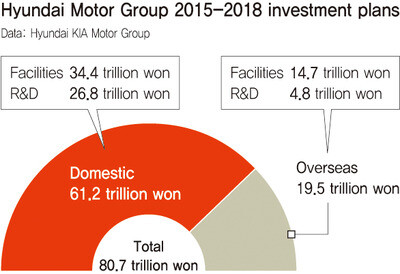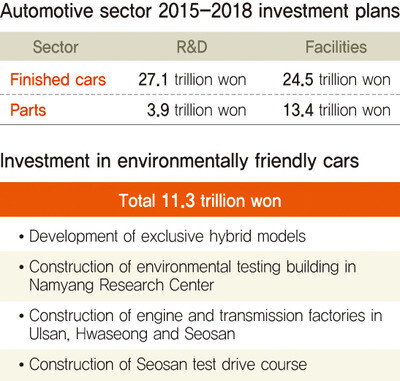hankyoreh
Links to other country sites 다른 나라 사이트 링크
Hyundai Motor announces huge investments through 2018

The Hyundai Motor Group is planning investments of nearly US$74 billion (about 81 trillion won) through 2018.
Its aim is to maintain its robust growth with continued facility investments after achieving over eight million sales in the global market last year, while proactively funding R&D for the development of eco-friendly vehicle models to drive future growth.
The group announced plans on Jan. 6 to invest a total of 80.7 trillion won (US$73.6 billion) through 2018, including 49.1 trillion won (US$44.8 billion) in factory construction/expansion and other facility investments, and 31.6 trillion won (US$28.8 billion) in R&D for eco-friendly vehicles and smart cars. The investment will amount to around 20.2 trillion won (US$18.4 billion) per year.

Last year, the group recorded an all-time-high 14.9 trillion won (US$13.6 billion) in investments. While around 11 trillion won (US$10 billion) of the new investment is earmarked for building a global business center on a former Korea Electric Power Corporation (KEPCO) site by 2018, the annual average for the remainder is still over two trillion won greater than the 2014 investment.
Experts are predicting most of the investment will go toward developing eco-friendly vehicles. Over the last four years, the group has invested 11.3 trillion won (US$10.3 billion) in developing plug-in hybrids, fully electric models, and hydrogen fuel cell vehicles. Previously, it announced a “mileage improvement road map” for increasing average mileage by 25% through 2020, along with plans for “technological innovation to respond to international environmental regulations by increasing the number of eco-friendly models from its current seven to 22 and joining the world’s top two in the eco-friendly vehicle market, which is predicted to grow from 2.2 million vehicles this year to 6.4 million by 2020.”
In addition to its eco-friendly vehicle investment, the group also plans to add 7,345 more R&D staff positions to shore up source technology for key parts like motors, batteries, and powertrains. In the process, it hopes to boost the quality competitiveness of its finished cars and fuel future growth with active development of smart cars and other “cars of the future.”
Facility investment is also being ramped up as part of a strategy to maintain growth after passing the eight-million mark in vehicle sales last year. Plans include developing overseas strategic model production capabilities by building new factories in China, while expanding domestic production facilities for engines and transmissions at factories in Ulsan and Hwaseong, Gyeonggi Province. Investment in related group-areas such as steel and distribution is also planned to boost the synergy effect with automobiles.
Perhaps the most noteworthy aspect of the plan is its emphasis on domestic investment. A total of 61.2 trillion won (US$55.8 billion), or 76% of the investment, is being put into South Korea - around 50 trillion won (US$45.6 billion) if the KEPCO lot development is not included. This could be an attempt to counter concerns that a preference for overseas over domestic investment may hollow out local manufacturing. The company currently predicts that the investment will create around 10,000 new jobs, including R&D personnel. The number of new hires may be even higher if facility investment is factored in.
Hyundai Motor Group’s move could put pressure on the South Korean business community. The huge increase in domestic investment in particular could create a climate where other corporations feel they have to invest in stimulating the economy and creating jobs.
“Bold investment is what helped us become one of the top five global automakers, and our investment this time could bring equal rewards to our contribution in terms of developing the national economy and creating jobs,” said a Hyundai Motor source.
By Park Seung-heon, staff reporter
Please direct questions or comments to [english@hani.co.kr]

Editorial・opinion
![[Column] Season 2 of special prosecutor probe may be coming to Korea soon [Column] Season 2 of special prosecutor probe may be coming to Korea soon](https://flexible.img.hani.co.kr/flexible/normal/500/300/imgdb/original/2024/0426/3317141030699447.jpg) [Column] Season 2 of special prosecutor probe may be coming to Korea soon
[Column] Season 2 of special prosecutor probe may be coming to Korea soon![[Column] Park Geun-hye déjà vu in Yoon Suk-yeol [Column] Park Geun-hye déjà vu in Yoon Suk-yeol](https://flexible.img.hani.co.kr/flexible/normal/500/300/imgdb/original/2024/0424/651713945113788.jpg) [Column] Park Geun-hye déjà vu in Yoon Suk-yeol
[Column] Park Geun-hye déjà vu in Yoon Suk-yeol- [Editorial] New weight of N. Korea’s nuclear threats makes dialogue all the more urgent
- [Guest essay] The real reason Korea’s new right wants to dub Rhee a founding father
- [Column] ‘Choson’: Is it time we start referring to N. Korea in its own terms?
- [Editorial] Japan’s rewriting of history with Korea has gone too far
- [Column] The president’s questionable capacity for dialogue
- [Column] Are chaebol firms just pizza pies for families to divvy up as they please?
- [Column] Has Korea, too, crossed the Rubicon on China?
- [Correspondent’s column] In Japan’s alliance with US, echoes of its past alliances with UK
Most viewed articles
- 1[Column] Season 2 of special prosecutor probe may be coming to Korea soon
- 2‘We must say no’: Seoul defense chief on Korean, USFK involvement in hypothetical Taiwan crisis
- 3No good, very bad game for Korea puts it out of Olympics for first time since 1988
- 4Division commander ordered troops to enter raging flood waters before Marine died, survivor says
- 5Is Japan about to snatch control of Line messenger from Korea’s Naver?
- 6Korea’s 1.3% growth in Q1 signals ‘textbook’ return to growth, says government
- 7Is N. Korea threatening to test nukes in response to possible new US-led sanctions body?
- 8[Editorial] Korea’s surprise Q1 growth requires objective assessment, not blind fanfare
- 9[Editorial] New weight of N. Korea’s nuclear threats makes dialogue all the more urgent
- 10‘Weddingflation’ breaks the bank for Korean couples-to-be